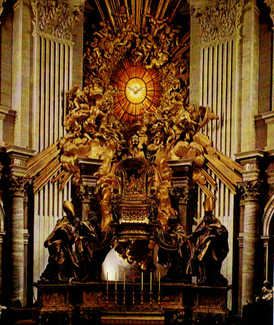Whatever you will bind on earth will be bound in heaven, and whatever you loose on earth will be loosed in heaven, the Lord said to Simon Peter.
O God, Who having given Peter, Thy Apostle, the keys of the kingdom of heaven, did bestow on him the pontifical power of binding and loosing; grant that by the help of intercession we may be delivered from the bonds of our sins.
On this feast in 2009, Pope Benedict taught the following in an audience:

"This Sunday is also the feast of the Chair of Peter, an important liturgical feast that highlights the office of the successor of the Prince of the Apostles. The chair of Peter symbolizes the authority of the Bishop of Rome, who is called to perform a special service for the whole People of God. Immediately after the martyrdom of Saint Peter and Saint Paul, the primacy of the Church of Rome in the Catholic community was recognized. This role was already attested to in the 2nd century by Saint Ignatius of Antioch (Letter to the Romans, Pref.: Funk, I, 252) and by Saint Irenaeus of Lyons (Contra Haereses, III, 3, 2-3). This singular and specific ministry of the Bishop of Rome was stressed again by the Second Vatican Council. "Moreover, within the Church," we read in the Dogmatic Constitution on the Church, "particular Churches hold a rightful place; these Churches retain their own traditions, without in any way opposing the primacy of the Chair of Peter, which presides over the whole assembly of charity (cf. Saint Ignatius of Antioch, Letter to the Romans, Pref.) and protects legitimate differences, while at the same time assuring that such differences do not hinder unity but rather contribute toward it" (Lumen Gentium, 13).
Pope Benedict XVI,
Feast of the Chair of Saint Peter, 22 February 2009
The Church celebrates today, since the 4th century, the Feast of the Chair of Saint Peter, Apostle. The Church does not worship church furnishings but the office that was given to the Apostle Peter by the Lord Himself. This chair, then, is the key to unity among Christians. Hence, it is not just a chair, but a throne or cathedra, i.e., a seat of pastoral authority. It is not an authority for temporal affairs or political engagement. It is about preaching, teaching and sanctifying God's people. These three functions are to lead others to heaven --communio with the Blessed Trinity.
For what purpose does the Church have a feast called the "Chair of Saint Peter" and how is it connected with unity among Christians? Saint Cyprian, Carthage's bishop (d. 258), tells us,
"The Lord says to Peter: 'I say to you,' He says, 'that you are Peter, and upon this rock I will build my Church, and the gates of hell will not overcome it. And to you I will give the keys of the kingdom of heaven: and whatever things you bind on earth shall be bound also in heaven, and whatever you loose on earth, they shall be loosed also in heaven.' And again He says to him after His resurrection: 'Feed my sheep.' On him He builds the Church, and to him He gives the command to feed the sheep; and although He assigns a like power to all the Apostles, yet He founded a single chair, and He established by His own authority a source and an intrinsic reason for that unity. Indeed, the others were that also which Peter was; but a primacy is given to Peter whereby it is made clear that there is but one Church and one chair. So too, all are shepherds, and the flock is shown to be one, fed by all the Apostles in single-minded accord. If someone does not hold fast to this unity of Peter, can he imagine that he still holds the faith? If he desert the chair of Peter upon whom the Church was built, can he still be confident that he is in the Church?"
"There is one God and one Christ, and one Church, and one Chair founded on Peter by the word of the Lord. It is not possible to set up another altar or for there to be another priesthood besides that one altar and that one priesthood. Whoever has gathered elsewhere is scattering."
Saint Cyprian is very clear that Christ founded upon Saint Peter the visible basis of the unity of the Church. Peter does not replace Christ as the head of the Church. In theological terms this feast notes, observes and otherwise holds up a primacy given by the Lord to Saint Peter to ensure and preserve her unity. Saint Cyprian argues:
"With a false bishop appointed for themselves by heretics, they dare even to set sail and carry letters from schismatics and blasphemers to the chair of Peter and to the principal Church, in which sacerdotal unity has its source; nor did they take thought that these are Romans, whose faith was praised by the preaching Apostle, and among whom it is not possible for perfidy to have entrance."
For Saint Cyprian, the unity of the bishops and priests has its source (not only as a past event but as a living, thriving principle) in the Chair of Saint Peter.
Last year's blog post may also have some relevant info...


Leave a comment